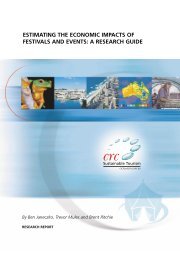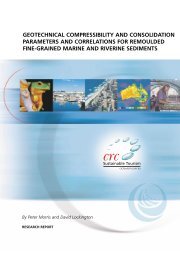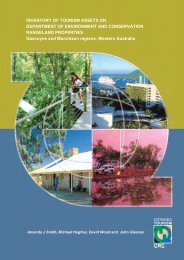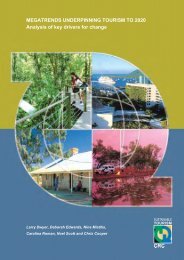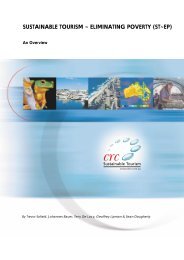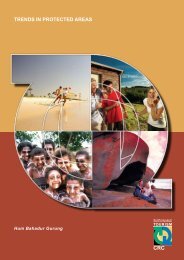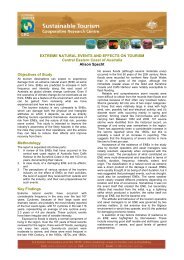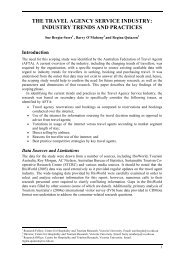icolls - Sustainable Tourism CRC
icolls - Sustainable Tourism CRC
icolls - Sustainable Tourism CRC
Create successful ePaper yourself
Turn your PDF publications into a flip-book with our unique Google optimized e-Paper software.
ECOLOGY, THREATS AND MANAGEMENT OPTIONS FOR SMALL ESTUARIES AND ICOLLS<br />
composition and ecosystem function, efforts to control the spread of exotic species should be increased to ensure<br />
the survival and sustainable conservation (and harvesting) of natural resources (Lovejoy 1992; Vander Zanden,<br />
Casselman & Rasmussen 1999; Shea & Chesson 2002). Whilst ‘invasions’ by marine species that<br />
opportunistically utilise estuarine nursery grounds are likely to be commonplace in ICOLLs, the timing and<br />
duration of forced openings may influence the patterns by which species utilise these coastal waterways. This is<br />
likely to be particularly true in systems that are normally opened by high rainfall events, where freshwater inputs<br />
are crucial to the survival of the resident biota through the promotion of spawning events (Hutchings, Beckley,<br />
Griffiths, Roberts, Sundby & van der Lingen 2002).<br />
Knowledge Gaps, Research Priorities and Ecologically <strong>Sustainable</strong><br />
Management Practices for ICOLLs<br />
There is little doubt that coastal zone environments remain one of the most threatened biomes in the world, not<br />
only due to increasing urban development, but also via increased pressure on estuarine and off-shore fisheries<br />
and growing tourism industries (Ducrotoy & Pullen 1999; Kullenberg 2001; Schittone 2001; Tran, Euan & Isla<br />
2002). The potential for all of these factors to have deleterious impacts on ICOLL ecology is substantial,<br />
particularly in light of the fact that these systems are often overlooked in terms of the role they play in nutrient<br />
cycling, fisheries production, environmental aesthetics, conservation of biodiversity and as significant coastal<br />
recreation areas.<br />
Whilst sustainable management of coastal resources is the common goal of conservation and resource<br />
managers, the current absence of reliable ecological data for ICOLLS inhibits the design and implementation of<br />
ecologically sustainable management actions and programs (Smith & Pollard 1996; Hutchings et al. 2002).<br />
Empirical evidence is scattered and scant and it is likely that some of the management practices adopted for<br />
ICOLL catchments and systems can significantly influence their health and longevity (Allanson 2001; Lewis et<br />
al. 2001; Pearce & Schumann 2001; Bohn & Kershner 2002; Pijanowski, Shellito, Pithadia & Alexandridis<br />
2002). For example, many studies suggest that forested catchments stabilise the delivery of sediment, nutrient<br />
and hydrologic loads to aquatic ecosystems (Balls et al. 1995; Bowen & Valiela 2001; Habron 2003). In contrast,<br />
catchment modification (including vegetation clearing for agriculture, industrial or urban development) is likely<br />
to increase inputs into these coastal systems (Lewis et al. 2001; Valiela & Bowen 2002). Furthermore, reduced<br />
catchment vegetation may influence flood periodicity, duration and extent, which in turn may influence ‘natural’<br />
ICOLL mouth opening and closing dynamics and/or the motivation of local authorities to establish an artificial<br />
opening regime (Snow, Adams & Bate 2000; Allanson 2001; Froneman 2002; Young & Potter 2002).<br />
Management strategies implemented to ameliorate the threatening processes discussed above need to take<br />
into consideration the ecology of individual ICOLL ecosystems, to ensure management efforts do not adversely<br />
affect the health of biota within ICOLLs and their overall ecological status. Whilst much of the literature on<br />
estuaries can inform the conceptualisation of ICOLL ecological processes and threats, only dedicated research in<br />
these systems will ensure coastal conservation, recreation and fisheries production goals are met in the future. To<br />
this end, the identification of key knowledge gaps is essential to prioritise research that will enable ecologically<br />
sustainable management of these systems. Table 1 presents an overview and synthesis of the processes<br />
threatening the long-term ecological health of ICOLLs, with usual causes, anticipated ecological effects and the<br />
likely management actions required to ameliorate impacts and/or preserve ICOLL ecological structure and<br />
function. The key issues are altered freshwater inflows, artificial opening regimes, inputs from STPs and<br />
excessive runoff from industrial, urban and agricultural land uses. These issues undoubtedly threaten the longterm<br />
sustainability of ICOLLs and the species that inhabit them. The ecological status of ICOLLs in relation to<br />
increasing coastal development will continue to be of concern unless sustainable management practices tailored<br />
for these unique systems are researched and implemented.<br />
13



